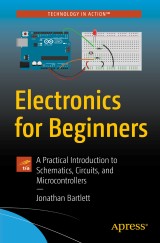Details

Electronics for Beginners
A Practical Introduction to Schematics, Circuits, and Microcontrollers|
62,99 € |
|
| Verlag: | Apress |
| Format: | |
| Veröffentl.: | 01.09.2020 |
| ISBN/EAN: | 9781484259795 |
| Sprache: | englisch |
Dieses eBook enthält ein Wasserzeichen.
Beschreibungen
Jump start your journey with electronics! If you’ve thought about getting into electronics, but don’t know where to start, this book gives you the information you need. Starting with the basics of electricity and circuits, you'll be introduced to digital electronics and microcontrollers, capacitors and inductors, and amplification circuits – all while gaining the basic tools and information you need to start working with low-power electronics.<div><br></div><div><i>Electronics for Beginners</i> walks the fine line of focusing on projects-based learning, while still keeping electronics front and center. You'll learn the mathematics of circuits in an uncomplicated fashion and see how schematics map on to actual breadboards. Written for the absolute beginner, this book steers clear of being too math heavy, giving readers the key information they need to get started on their electronics journey.</div><div><b><br></b></div><div><b>What You’ll Learn</b></div><div><ul><li>Review the basic “patterns” of resistor usage—pull up, pull down, voltage divider, and current limiter</li><li>Understand the requirements for circuits and how they are put together</li><li>Read and differentiate what various parts of the schematics do</li><li>Decide what considerations to take when choosing components</li><li>Use all battery-powered circuits, so projects are safe</li></ul></div><div><b>Who This Book Is For</b></div><div><b><br></b></div><div>Makers, students, and beginners of any age interested in getting started with electronics. </div>
<p><p>Chapter 1: Introduction.- Chapter 2. Before We Begin.- Part I – Basic Concepts.- Chapter 3. Dealing with Units.- Chapter 4. What is Electricity?.- Chapter 5. Voltage and Resistance.- Chapter 6. Your First Circuit.- Chapter 7. Constructing and Testing Circuits.- Chapter 8. Analyzing Series and Parallel Circuits.- Chapter 9. Diodes and How to Use Them.- Chapter 10. Basic Resistor Circuit Patterns.- Chapter 11. Understanding Power.- Part II – Digital Electronics and Microcontrollers.- Chapter 12. Integrated Circuits and Resistive Sensors.- Chapter 13. Using Logic ICs.- Chapter 14. Introduction to Microcontrollers.- Chapter 15. Building Projects with Arduino.- Chapter 16. Analog Input and Output on an Arduino.- Part III – Capacitors and Inductors.- Chapter 17. Capacitor Introduction.- Chapter 18. Capacitors as Timers.- Chapter 19. Introduction to Oscillating Circuits.- Chapter 20. Producing Sound with Oscillation.- Chapter 21. Inductors.- Chapter 22. Inductors and Capacitors in Circuits.- Chapter 23. Reactance and Impedance.- Part IV – Amplification Circuits.- Chapter 24. DC Motors.- Chapter 25. Amplifying Power with Transistors.- Chapter 26. Transistor Voltage Amplifiers.- Chapter 27. Examining Partial Circuits- Chapter 28. Going Further.- Appendices.- A. Glossary.- B. Electronics Symbols.- C. Integrated Circuit Naming Conventions.- D. Electronics Equations and Where They Come From.- E. Simplified Datasheets for Common Devices.</p><br></p>
Jonathan Bartlett is a software developer, researcher, and writer. His first book, <i>Programming from the Ground Up</i>, has been required reading in computer science programs from DeVry to Princeton. He has been the sole or lead author for eight books on topics ranging from computer programming to calculus. He is a technical lead for ITX, where his specialty is getting stuck projects unstuck. Jonathan regularly writes for the blog MindMatters.ai.
Jump start your journey with electronics! If you’ve thought about getting into electronics, but don’t know where to start, this book gives you the information you need. Starting with the basics of electricity and circuits, you'll be introduced to digital electronics and microcontrollers, capacitors and inductors, and amplification circuits – all while gaining the basic tools and information you need to start working with low-power electronics.<div><br></div><div><i>Electronics for Beginners</i> walks the fine line of focusing on projects-based learning, while still keeping electronics front and center. You'll learn the mathematics of circuits in an uncomplicated fashion and see how schematics map on to actual breadboards. Written for the absolute beginner, this book steers clear of being too math heavy, giving readers the key information they need to get started on their electronics journey.</div><div><b><br></b></div><div>You will:</div><div><ul><li>Review the basic “patterns” ofresistor usage—pull up, pull down, voltage divider, and current limiter</li><li>Understand the requirements for circuits and how they are put together</li><li>Read and differentiate what various parts of the schematics do</li><li>Decide what considerations to take when choosing components</li><li>Use all battery-powered circuits, so projects are safe</li></ul></div>
Learn the basics about electronics, breadboarding, microcontrollers, and more Understand how schematics map onto actual breadboard circuits Challenge yourself with additional practice questions and projects and implement them into your classroom

















